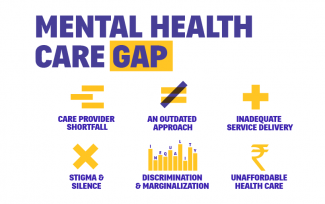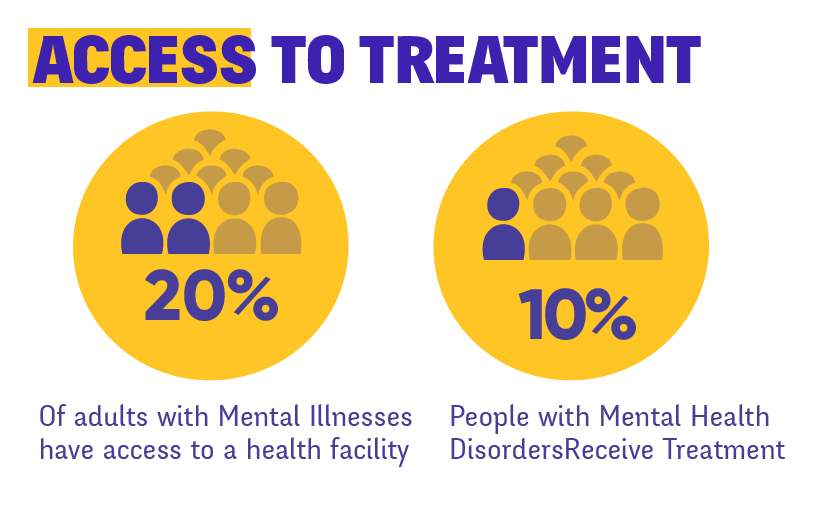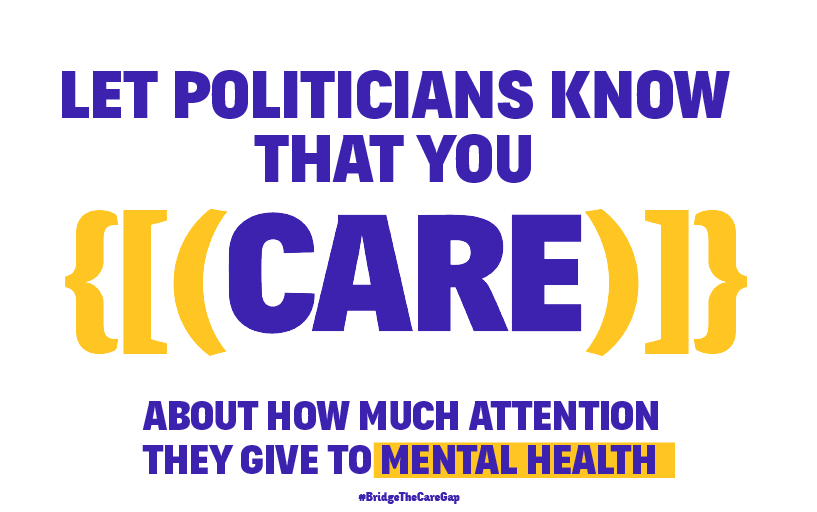
Although the right to health care of any kind has become a legal provision for the first time in India, implementing the Mental Healthcare Act (MHCA) is still challenging to all stakeholders. Sign the petition to bridge the mental health care gap.
Contributed by Mariwala Health Initiative
What is the Mental Health Care Gap?
If one goes by global statistics, then one in four of us will at some point be affected by a mental health issue in our lifetime. India’s National Mental Health Survey (2016), which is the latest and most comprehensive survey of mental illness in the country, shows that around 10.6 percent of people in India have a mental health condition which requires treatment. That's nearly 130 million people in the country. However, 80% of those living with psychosocial stressors or mental health issues remain without support for over a year, due to lack of access to quality, accessible, affordable mental health care. This gap—between how pervasive mental health conditions are and the lack of resources/care/treatment for those living with these conditions—is what we refer to as the mental health care gap.
India’s mental health care gap is mirrored across the world, and research indicates that nearly two-thirds of those living with mental health disorders never seek professional help. Moreover, two-thirds of countries worldwide, including India, spend less than 1% of their budgets on mental health. Low budgetary prioritization translates into insufficient care facilities at primary, secondary and tertiary levels. According to the WHO, about 25% of countries do not have the three most commonly prescribed drugs used to treat schizophrenia, depression and epilepsy at the primary health care level. India’s mental health system also has a severe shortfall of trained mental health professionals, for example, there are currently less than 4,000 psychiatrists available across the country.

Why ‘Bridge’ the Care Gap?
The mental health ‘care gap’—reflected in a shortfall of trained mental health professionals, poor availability of medication to treat major mental illness, low government budgetary allocations towards mental health services across the country, discriminatory mental health care services and human rights violations—severely impacts the 130 million Indians living with mental health conditions. If services that are more effective and humane are made available, accessible and affordable, then those living with mental health issues can “avail treatments that help them avoid chronic disability and premature death; and support that gives them a life that is healthier and richer – a life lived with dignity” . If India were to invest in bridging the care gap in mental health, it will ensure that individuals and communities are better able to avoid or cope with the stresses and conflicts of everyday life, and as a result enjoy a better quality of life and better health.
Where The Mind Is Without Fear
What India’s New Mental Health Care Act Provides
India's Mental Health Care Act 2017 aims to bridge the mental health care gap by incorporating a rights-based approach, through the following provisions:
- Universal access to quality mental health care
The new Mental Health Care Act grants a legally binding right to access mental health care and treatment to all Indian citizens. Safeguarding the rights of marginalized groups, the Act ‘assures free quality treatment for homeless persons or for those living below the poverty line (BPL), even if they do not possess a BPL card.’
- Increased focus on human rights
The Act safeguards social rights of persons living with mental health issues including their right to confidentiality, to live within society, live with dignity, have access to safe and hygienic environment and be protected from all forms of physical, verbal, emotional and sexual abuse. Under the new act, a person’s right to access their medical records, to avail free legal aid, to make complaints about deficiencies in services - are also upheld.
- Increased patient autonomy
Another progressive feature of the new Act, is ‘Advance Directive’, a measure that empowers a mentally ill person to have the right to make an advance directive toward the way she/he wants to be treated for the requisite illness and who her/his nominated representative shall be. Under India’s new Mental Health Care Act, persons living with a mental illness and their families play an active role in their own recovery process and not just remain passive recipients of services.
- Decriminalization of suicide
The Act also decriminalizes suicide and holds the State responsible for rehabilitating those who have attempted suicide.
- Eliminating the Shortfall of mental health professionals
Given the huge shortage of trained mental health professionals in the country, the Act requires the government to meet internationally accepted norms for the number of mental health professionals within 10 years of passing this law.
Why Implementing the Act Matters
Although the ‘right to health care of any kind’ has become a legal provision for the first time in India, implementing this Act was bound to be challenging to all stakeholders. The government healthcare system isn’t prepared to provide quality, affordable, accessible mental health care to over 1.5 billion people—therefore, without a public nudge, we’d likely see no change in the status quo. Since the Mental Health Care Act (2017) and the National Mental Health Policy (2014) have already been passed by the executive arm of the government, it is now a matter of holding our political leaders accountable. Ensuring all the progressive provisions within the new Mental Health Care Act translate into action on the ground—requires a people’s movement of sorts. If we want change—we will all need to rally.
Hence #BridgeTheCareGap campaign is a way of reminding the Government, politicians and policymakers of the importance of addressing mental health in our country. The campaign calls on the Indian government to proactively safeguard the rights of persons living with a mental illness, ensure their full-participation in decision-making processes concerning their own health, address social and economic disparities that compound mental health conditions and provide quality, accessible and affordable mental health services.
Since mental health is an issue that you, a family member, or a loved one is likely to face at some point in time, it is in our interests to ensure that the Indian health systems gears up to meet the needs of all those living with mental health conditions and is able to provide quality, affordable, accessible mental health care to all.
Sign the #BridgeTheCareGap petition and let politicians know that mental health matters to you.

For more details on this initiative visit: www.bridgethecaregap.com and see the video below.






